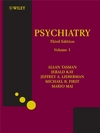Pharmacologic Management of Treatment-Resistant Unipolar Depression
Summary
Treatment-resistant depression (TRD) is a common, challenging, and debilitating condition. The limited systematic study to date has elucidated clinical correlates, but no clinically useful predictors of TRD. In this chapter, we review the evidence for multiple treatment approaches to TRD. Sequenced Treatment Alternatives to Relieve Depression (STAR*D) is a large NIMH-sponsored trial of treatments for major depression, conducted in clinical settings with patients having a broad range of psychiatric and medical comorbidity. STAR*D found that remission rates decrease dramatically in patients who have not responded to at least two pharmacologic treatments. It provided evidence that switching to an antidepressant of a different pharmacologic profile may be no more likely to result in remission than switching to an antidepressant with a similar profile as a first treatment. STAR*D demonstrated the effectiveness of switching, combination, and augmentation strategies in TRD. It found that both response without remission and remission achieved after several treatment steps predispose to relapse. While STAR*D primarily studied treatments with a substantial evidence base, a range of less-studied innovative strategies may treat TRD effectively. Developments in brain imaging and genetics may allow psychiatrists to select treatments for TRD based on biological predictors of treatment response in the future, which would reduce the burden of this illness for both patients and society.



